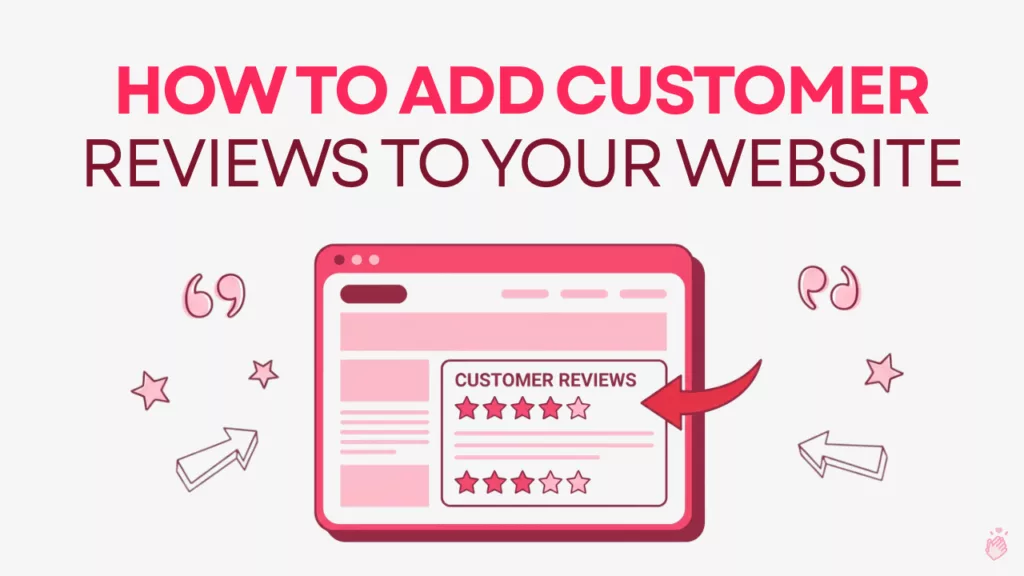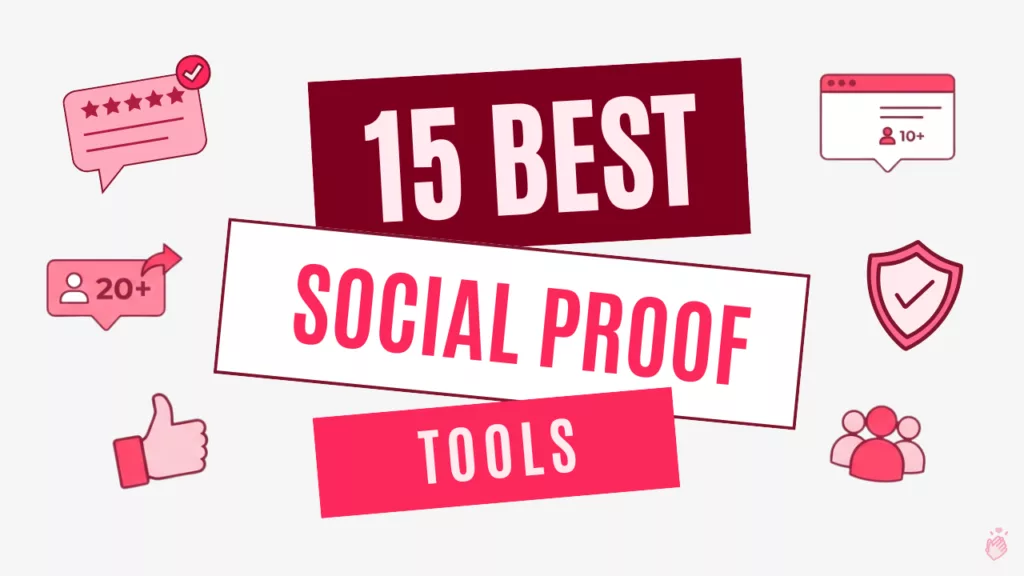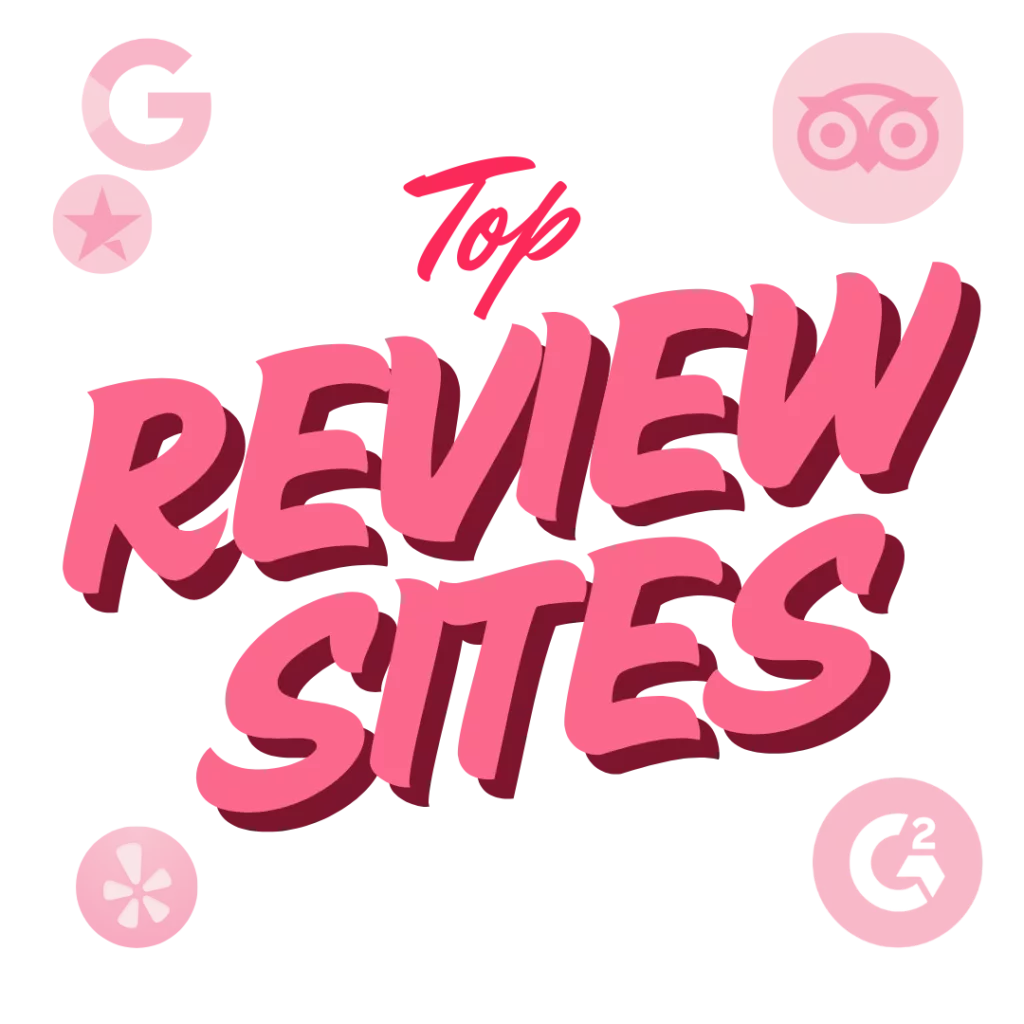
TL;DR: Best Customer Review Sites for Your Business
🔹 Google Reviews – Boosts local SEO & search visibility. Essential for local businesses.
🔹 Trustpilot – Verified reviews & analytics. Ideal for e-commerce.
🔹 Yelp – Strong for restaurants & service businesses. Community-driven.
🔹 TripAdvisor – Must-have for travel & hospitality businesses.
🔹 G2 – Focused on B2B software with in-depth comparisons.
🔹 Shapo – Centralized review management with video & widgets.
Key Takeaways:
✅ Pick platforms based on your industry & target audience.
✅ Actively manage reviews to build trust & increase conversions.
✅ Google Reviews dominates local SEO, while Trustpilot, Yelp, G2, and TripAdvisor excel in their respective niches.
✅ Use a tool like Shapo to streamline and showcase testimonials efficiently.
📌 Bottom line: Reviews drive trust, visibility, and revenue—choose the right platform and engage consistently! 🚀
Looking for the best customer review sites to boost your business? Here’s a quick guide to six top platforms tailored to different industries and goals:
- Google Reviews: Essential for local businesses to improve SEO and visibility.
- Trustpilot: Ideal for e-commerce with verified reviews and analytics.
- Yelp: Perfect for service businesses like restaurants and home services.
- TripAdvisor: A must for the travel and hospitality sector.
- G2: Focused on B2B software and tech reviews.
- Shapo: Centralized testimonial management with video and widget options.
Quick Comparison
| Platform | Best For | Key Features | Limitations |
|---|---|---|---|
| Google Reviews | Local businesses | Boosts SEO, integrates with Maps/Search | Limited analytics, no custom widgets |
| Trustpilot | E-commerce | Verified reviews, analytics, customizable | Paid plans for advanced features |
| Yelp | Service businesses | Strong local presence, detailed profiles | Aggressive review filtering |
| TripAdvisor | Travel & hospitality | Global reach, tailored tools for tourism | Limited outside hospitality |
| G2 | B2B software | Product comparisons, verified reviews | Higher costs, niche focus |
| Shapo | Testimonial showcase | Video testimonials, centralized management | Limited free plan, emerging platform |
Key takeaway: Choose platforms based on your industry and audience. Actively manage reviews to build trust and drive growth.
Which Online Reviews Will Help YOUR Business Most?
1. Google Reviews

Google Reviews plays a key role in shaping a business’s online reputation, thanks to its seamless integration with Google Search and Maps. This connection makes it a go-to platform for businesses aiming to strengthen their digital footprint.
The platform combines star ratings, detailed customer feedback, and the ability to share photos and videos. It also offers tools for managing responses effectively. Actively managing reviews can significantly boost a business’s chances of ranking in the “Map Pack” – those top three local business listings in search results [1][3].
Take Shannon Fine Jewelry, with its perfect 5-star rating across 200 reviews, or Gallery Furniture, which has amassed over 9,500 reviews. These businesses show how engaging with reviews can drive both website traffic and in-store visits [1].
If you’re looking to get the most out of Google Reviews, here are some tips:
- Ask for reviews right after completing a service.
- Respond to all reviews within 24-48 hours.
- Use customer feedback to make meaningful improvements.
- Monitor reviews consistently to maintain search visibility.
You can measure the platform’s impact using these key metrics:
| Metric | Business Impact |
|---|---|
| Review Quantity | Improves local search visibility |
| Response Rate | Builds trust with customers |
| Star Rating | Encourages more clicks in search results |
| Review Frequency | Shows active engagement |
For businesses focused on local customers, Google Reviews is a critical part of any review management strategy. Its integration with Google’s ecosystem means positive reviews can drive both online visibility and real-world traffic.
To stand out, focus on genuine interactions and steady engagement rather than just chasing numbers. This approach not only builds credibility but also supports long-term SEO efforts.
While Google Reviews is excellent for local SEO, e-commerce businesses might find platforms like Trustpilot better suited to their needs.
2. Trustpilot

Trustpilot is a popular platform designed for e-commerce and global businesses, providing verified customer feedback and easy-to-use review management tools. These features help businesses build trust and increase conversions in competitive markets.
With customizable widgets that show real-time customer reviews, Trustpilot helps businesses showcase credibility. Considering that 85% of consumers trust online reviews as much as personal recommendations [2], these tools can directly influence growth.
Here’s a breakdown of Trustpilot’s key features:
| Feature | Business Benefit | How It Works |
|---|---|---|
| Verified Reviews | Builds trust with verified purchases | Uses an automated system to confirm real buyers |
| Analytics Dashboard | Offers insights for improvement | Tracks trends in customer sentiment and metrics |
| SEO Benefits | Improves search visibility | Integrates rich snippets into Google search |
Pricing starts at $299/month for premium features tailored to larger businesses, while a free plan is available for basic review management [4].
Trustpilot simplifies the process of collecting customer reviews with an automated system that sends post-purchase requests, all while adhering to review policies [2][4]. Its analytics tools allow businesses to monitor customer sentiment and satisfaction, using the data to make informed decisions.
The platform also integrates with major platforms like Google and Facebook, ensuring reviews reach a broader audience [4]. Trustpilot’s verification process ensures reviews are genuine, striking a balance between credibility and accessibility [2].
Responding to reviews shows a commitment to customer satisfaction and helps enhance online reputation. While Trustpilot is ideal for e-commerce and global businesses, options like Yelp may be better for local or service-based companies.
3. Yelp
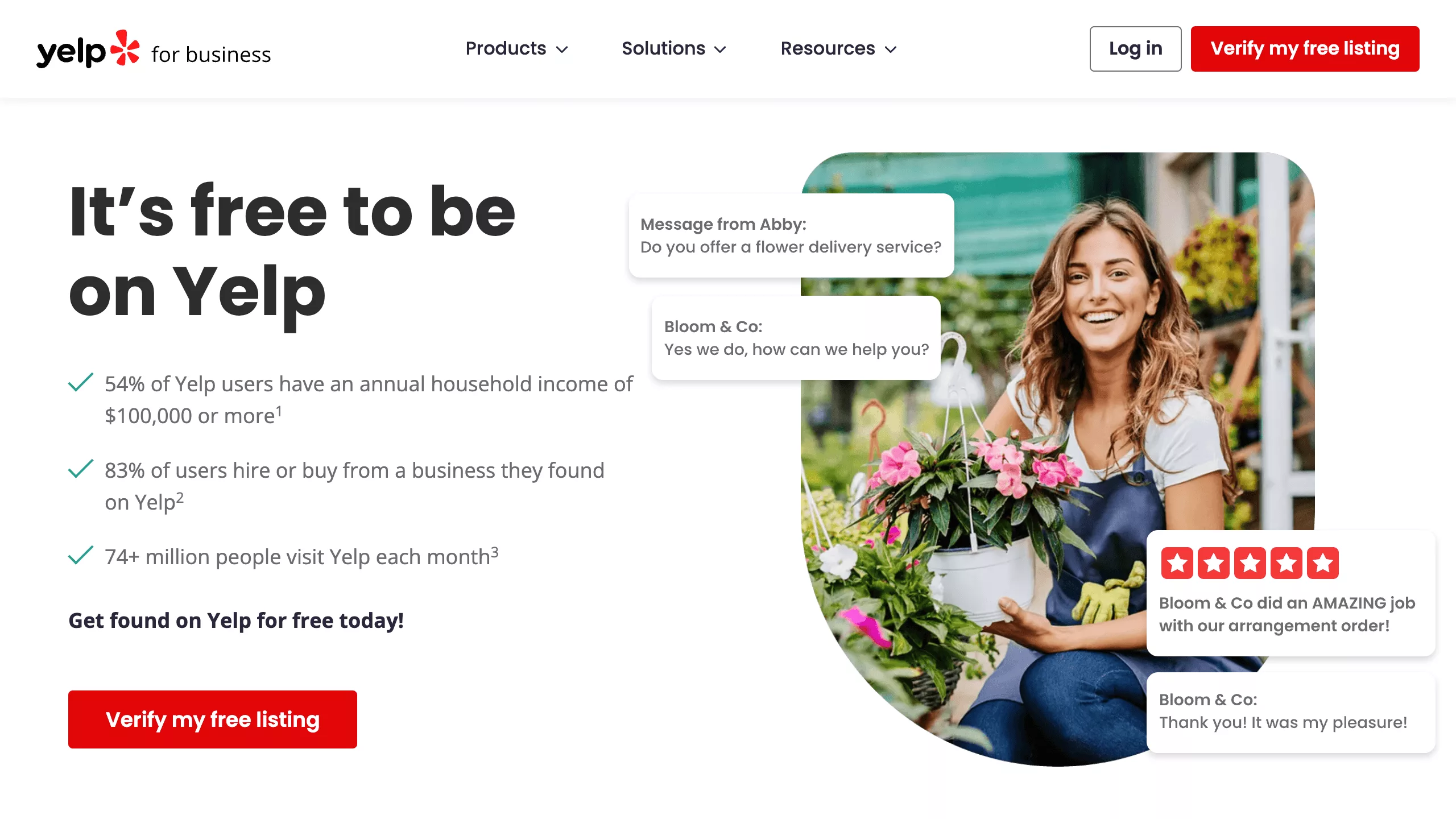
Yelp is a go-to platform for local business reviews, drawing over 145 million unique visitors each month across 32 countries. While Google Reviews caters to a broad range of industries, Yelp shines in providing localized exposure for service-oriented businesses, especially in sectors like restaurants, retail, and home services.
Here are some key features that help businesses connect with local customers:
| Feature | Benefit for Businesses |
|---|---|
| Business Profile | Manage listings to boost local visibility |
| Review Management | Engage with customers and build trust |
| Analytics Dashboard | Gain insights to improve performance |
| Local Advertising | Run targeted ads in specific areas |
Yelp sets itself apart with its strict review filtering system, ensuring reviews reflect real customer experiences. With an average rating of 3.5 out of 5 stars across its listings, Yelp has earned a reputation for reliable and transparent reviews.
To make the most of Yelp, businesses should:
- Claim and verify their business listing
- Regularly update photos, hours, and service details
- Respond to reviews promptly to maintain a strong local reputation
Yelp also offers specialized tools for different industries:
- Restaurants: Menu displays and reservation systems
- Healthcare: Tools to track patient feedback
- Home Services: Features for project estimates
- Automotive: Options for service quote requests
The platform’s guidelines promote honest and respectful reviews, making it a trusted resource in competitive local markets. While basic listings are free, premium features are available for businesses wanting more visibility and advanced tools.
For companies in hospitality and tourism, TripAdvisor might be a better fit for managing reviews in those specific niches.
4. TripAdvisor

TripAdvisor is a giant in the travel and hospitality world, drawing over 455 million unique visitors each month across 49 markets and 28 languages [1]. It’s a go-to platform for travelers and an essential tool for businesses looking to attract guests and manage their online reputation.
Here’s why it matters: 77% of travelers check reviews before booking accommodations, and 53% rely on TripAdvisor before making reservations [3]. If you’re in the hospitality industry, having a strong presence here isn’t optional – it’s a must.
Tailored Features for Different Businesses
TripAdvisor offers a range of features designed to meet the needs of various business types:
| Business Type | Key Features |
|---|---|
| Hotels & Resorts | Property listings, room details, and amenity tracking |
| Restaurants | Menu displays, reservation tools, and food photography |
| Tourist Attractions | Booking systems, seasonal updates, and pricing tools |
| Tour Operators | Experience packages, availability calendars, instant booking |
Premium Tools for Hospitality Businesses
The Business Advantage program provides extra tools to help businesses stand out:
| Feature | How It Helps |
|---|---|
| Priority Listing | Boosts visibility in search results |
| Direct Messaging | Enables real-time communication with potential guests |
| Performance Dashboard | Tracks competitor rankings and review trends |
| Special Offers | Promotes deals to specific traveler segments |
How to Maximize Your Presence
TripAdvisor’s review system is massive, with over 1 billion reviews covering 7.5 million+ accommodations, airlines, restaurants, and experiences [6]. To make the most of it, businesses should:
- Keep listings detailed and up-to-date.
- Upload high-quality photos that highlight standout amenities or experiences.
- Monitor competitors to stay ahead in your market.
For restaurants, TripAdvisor goes beyond reviews by integrating booking platforms and showcasing menus – a helpful way to attract more diners.
Safeguarding Your Reputation
TripAdvisor uses a verification process to ensure reviews are authentic. However, businesses should actively monitor for and report any suspicious activity to maintain a trustworthy profile.
While TripAdvisor dominates in travel and hospitality, platforms like G2 are better suited for businesses in tech and software industries.
5. G2
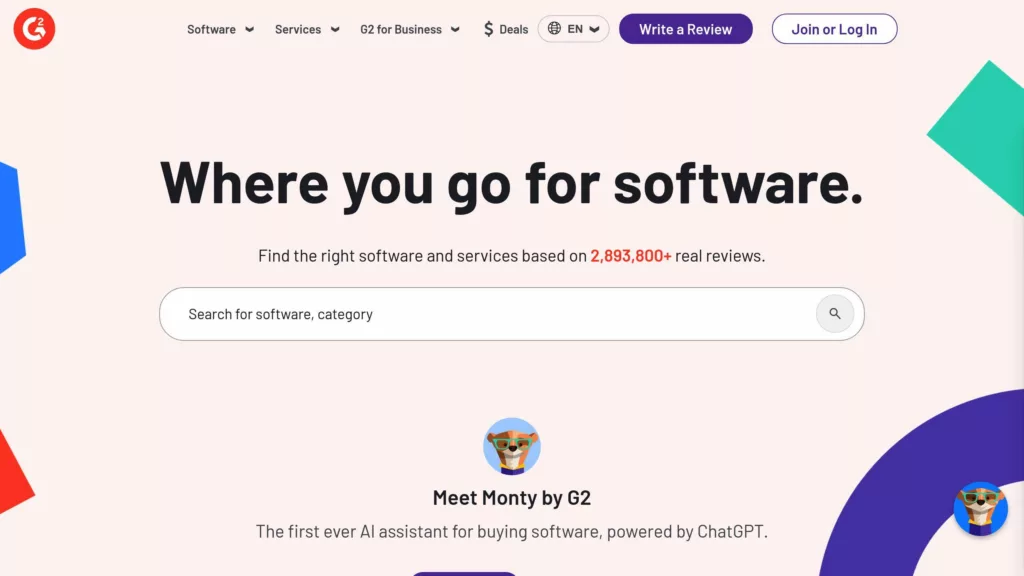
G2 is a go-to platform for businesses in the tech and software sectors, catering specifically to the needs of this industry. With more than 1 million verified reviews spanning various software categories and business services, G2 has established itself as a leading B2B software review site. Its focus on software and business tools makes it a trusted resource for companies looking for reliable feedback on tech investments.
The platform evaluates critical factors like user experience, implementation, ROI, support quality, and features, delivering actionable insights through its proprietary algorithm based on verified user input.
G2 provides a range of tools, including side-by-side comparisons, market reports, satisfaction scores, and verified reviews. These features empower businesses to carefully assess software options and make informed decisions.
For vendors, G2 offers opportunities to connect with customers and boost visibility. Free and premium options are available, with paid tiers unlocking advanced features like detailed analytics, competitor tracking, and profile customization.
G2 is especially useful for businesses exploring enterprise software, SaaS products, and other tech solutions. Its strong reputation highlights the importance of peer reviews in B2B software selection, helping companies avoid expensive implementation errors and choose tools that align with their needs.
While G2 specializes in software and tech reviews, platforms like Shapo provide broader solutions for managing and showcasing customer testimonials across various industries.
6. Shapo
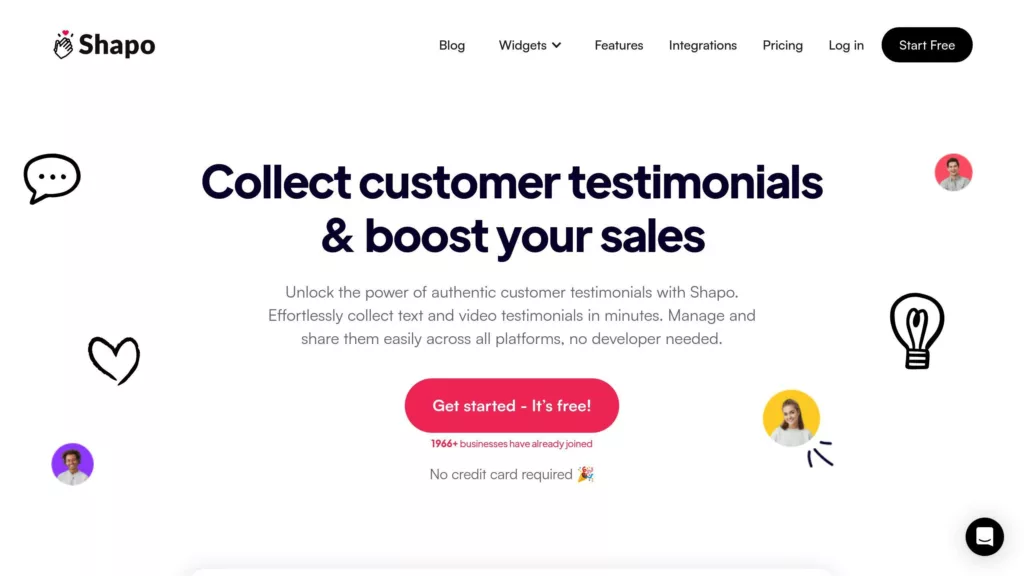
Shapo is a testimonial management platform designed to simplify how businesses collect, manage, and display customer reviews. With everything centralized in one dashboard, it helps companies establish trust and credibility with their audience.
Here’s what makes Shapo worth considering:
Review Collection and Management
- Flexible review forms, including options for video testimonials.
- Email campaign tools that let you send up to 500 invites (Pro plan).
- Automatic review imports every 24 hours.
Display and Integration
- Customizable widgets, like the ‘Wall of Love,‘ to showcase testimonials.
- Integrates easily with platforms like Shopify, WordPress, and Webflow.
- Manage reviews from multiple platforms all in one place.
| Plan | Features |
|---|---|
| Free | 10 testimonials, unlimited widgets, video testimonial support |
| Pro | Unlimited testimonials, white-label options, advanced tools for $29/month |
For businesses looking to strengthen their online presence, Shapo offers tools to efficiently collect and showcase customer feedback. Its intuitive dashboard lets you stay on top of reviews and respond quickly, making it a useful choice for managing and improving your online reputation.
Platform Strengths and Limitations
The table below highlights the key features and drawbacks of major review platforms:
| Platform | Key Strengths | Notable Limitations |
|---|---|---|
| Google Reviews | • Accounts for 73% of all online reviews [5] • Boosts local SEO and Map Pack visibility [1] • High visibility and consumer trust • Free to use | • Limited analytics • Basic review management tools • No customizable widgets |
| Trustpilot | • Detailed analytics dashboard • Verified reviews • Customizable widgets • Open platform for feedback [2] | • Advanced features require paid plans • Less influence on local SEO • Lower visibility compared to Google |
| Yelp | • Strong community engagement • Comprehensive business profiles • Industry-specific categories • Mobile-friendly | • Aggressive review filtering • Limited control over reviews • Popularity varies by region |
| TripAdvisor | • Recognized authority in travel • Detailed review metrics • Global reach • Features tailored to hospitality | • Limited use outside the travel and hospitality sectors • Seasonal review trends • Competitive ranking challenges |
| G2 | • Focused on B2B market • In-depth product comparisons • Professional user base • Verified reviews for businesses | • Higher costs • Limited appeal to general consumers • Restricted to specific industries |
| Shapo | • Centralized review management • Video testimonials supported • Integrates with multiple platforms • Customizable widgets | • Free plan limits to 10 testimonials • Emerging platform with evolving features • Email campaign on Pro plan |
Choosing the right platform depends on your business goals and audience. For instance, local restaurants may lean on Google Reviews for SEO and Yelp for community engagement. Meanwhile, B2B software companies might rely on G2 for credibility and Trustpilot for building trust in the market.
Keep in mind that 57% of consumers avoid businesses that ignore reviews [5]. To stay ahead, actively manage your presence on the platforms that align with your industry, target audience, and resources. Consider factors like budget, ROI, integration options, and geographic relevance when making your choice.
Key Takeaways
Different customer review platforms serve different business needs. Here’s a breakdown of how to use them effectively:
Google Reviews holds a massive 73% of the market, making it a must-have for local businesses. Its integration with Google Search and Maps gives businesses unparalleled visibility, though its analytics features are quite basic.
Trustpilot stands out for its verified reviews and analytics tools, making it ideal for e-commerce and service industries. With over 260 million monthly active users, companies like CarBrain have built credibility with more than 6,000 verified reviews.
Choosing the Right Review Site
Picking the right review platform helps align your efforts with your business goals and your audience’s preferences.
Matching Platforms to Your Industry
- Travel & Hospitality: TripAdvisor is a go-to choice, featuring over 225 million reviews and tools tailored for this sector.
- B2B Software: G2 is the leader here, boasting 90 million annual users and 500,000 reviews. Companies like Zoom (55,450 reviews) and Slack (32,858 reviews) have thrived on this platform.
- Service Industries: Yelp offers a detailed review system and an active community, making it ideal for restaurants and other service providers.
Tips for Managing Reviews Effectively
To make the most of these platforms, businesses should focus on smart review management:
- Stay active on platforms your audience uses most.
- Respond quickly to customer feedback to build trust.
- Use tools like Shapo to centralize and simplify review management.
It’s worth noting that 46% of U.S. consumers are willing to pay more for brands they trust [2]. This highlights the importance of choosing the right platforms and managing reviews effectively to grow your reputation and business in 2025.
Success doesn’t come from being everywhere – it comes from excelling on the platforms that matter most to your business and audience. With the right approach, customer reviews can become a powerful tool to build trust and drive growth.
FAQs
What is the best site for customer reviews?
The ideal review site depends on your business type and who you’re targeting. Google Reviews leads the pack, accounting for 73% of all online reviews. Its integration with Google Search and Maps makes it a powerful tool for boosting local visibility and SEO rankings [1][3].
Some platforms shine in specific industries: Google Reviews is great for local businesses, Trustpilot works well for e-commerce, TripAdvisor is a go-to for hospitality, and G2 is geared toward B2B software. The key is to pick platforms that fit your industry and audience, as covered in our earlier platform comparisons.
Which is the best review platform?
A study by London Research found that 65% of EU consumers consider customer reviews a critical part of their buying decisions [8]. To make the most of reviews, focus on 2-3 platforms that align with your business and audience.


